CCT Professor Highlight: Diana Owen
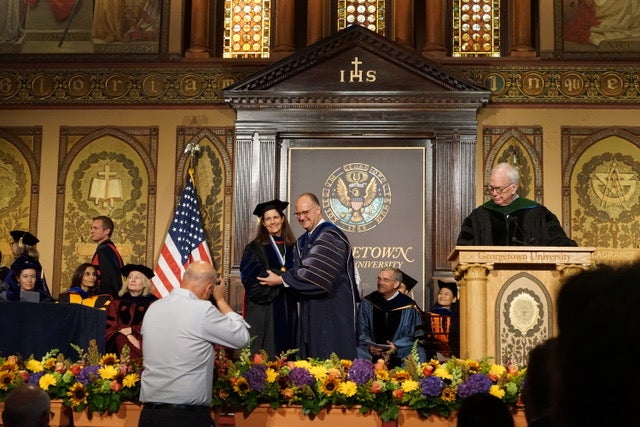
CCT is excited to feature Professor Diana Owen in our latest CCT professor highlight!
Owen went to undergrad at George Washington University, majoring in Political Science with a goal to go to law school. Her sophomore year she took a Public Opinion and Political Socialization course which discussed how people’s orientations towards politics, civic engagement, and citizenship started young through the socialization process, and she switched her focus to political science. She went to grad school at University of Wisconsin-Madison to study under Jack Dennis, protégé of political scientist David Easton. At that time, many thought political socialization scholarship was a dead end and she was encouraged to find another area of study, so she turned to media and politics and began working with the Mass Communication Research Center at the University’s Journalism School. About 20 years ago, she started working with the Center for Civic Education, where her research shifted to addressing the concern that young people were disengaged in politics and civic education became a revitalized area of research. Focusing on media’s role in socialization, she turned her attention to schools at the K-12 level, as schools are a locus of socialization that’s intentional and deliberate. Early research found schools had little/no effect on civic education, which led her to believe that it needed updating. She felt this area had the greatest potential to be transformative through planned, deliberate socialization to get students responsibly civically engaged.
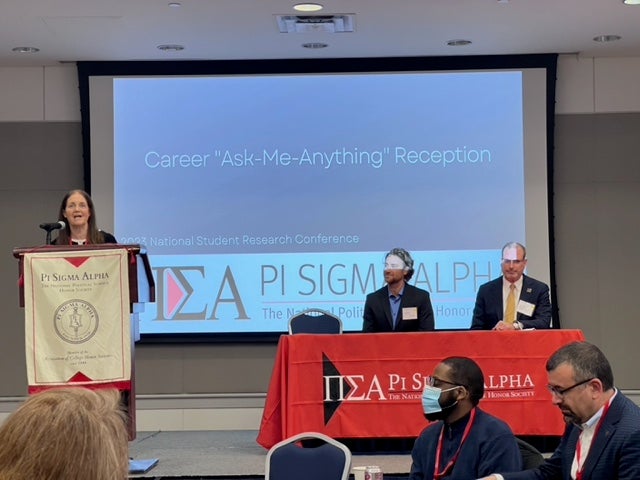
When Owen’s work started gaining traction, she talked to a former dean of the Georgetown Graduate School of Arts and Sciences and launched the Civic Education Research Lab (CERL) in 2017. CCT students in her classes have partnered with CERL to produce professional papers and publications. CERL makes it easy for her to bring people onto her research and to engage with projects they’re working on.
Owen’s current research trajectory began when she worked with the Center for Civic Education to develop a study of Indiana teachers using quasi experimental design, as she needed to demonstrate a particular intervention (taking a civics class or participating in a program) has a desired outcome. She looked at 22 schools serving a wide array of students and found they showed promise. She partnered with the Center, which implements curriculum development, provides teacher professional development, and facilitates classroom instruction by teachers nationwide, to get the first major Department of Education grant in 2015 ($17m for 4 years) to conduct a nationwide study. She and the Center applied for another grant to adapt the curriculum for these student populations and received funding for the James Madison Legacy Project Expansion ($7.4m) which studied the effectiveness of the Center’s We the People: The Citizen and the Constitution teacher professional development and classroom curriculum for high-need students. Her research discovered that high needs students made significant gains in civic knowledge, dispositions, and skills, with specific benefits for ELLs, students with disabilities, and students of color. Last year, she received another grant for Civics Empowers All Students ($11.65m) that studies elementary and middle school students who are less likely to receive civic education than high schoolers. Many of the students enrolled in the program this inaugural year are from high-need populations.
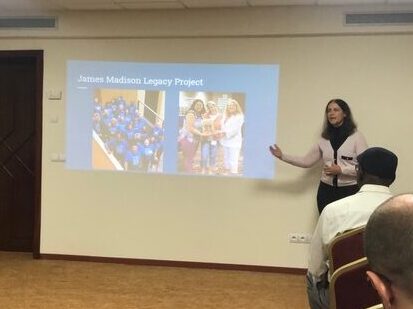
Owen and the Center received funding from the U.S. Department of Education for the Project Citizen Research Project ($3.3m) in 2019. This research studies the Center’s project-based curriculum, where students identify a problem in their community or school, research the problem, including using STEM techniques, and find a workable solution. The students create portfolios of their projects and then present their results to stakeholders, like community leaders, including state officials and members of the U.S. Congress.
“The research on Project Citizen demonstrates that quality civic education for all students can be transformative. Young people, including those on the margins, can learn how to effectively engage in their communities and advocate for positive change.”
Professor Owen
In March 2024, the Department of Education will sponsor a 2-day conference at Georgetown hosted by the Center and CERL to bring in two top educators in every state and DC to learn about the Project Citizen research and hear from prominent education researchers from across the country.
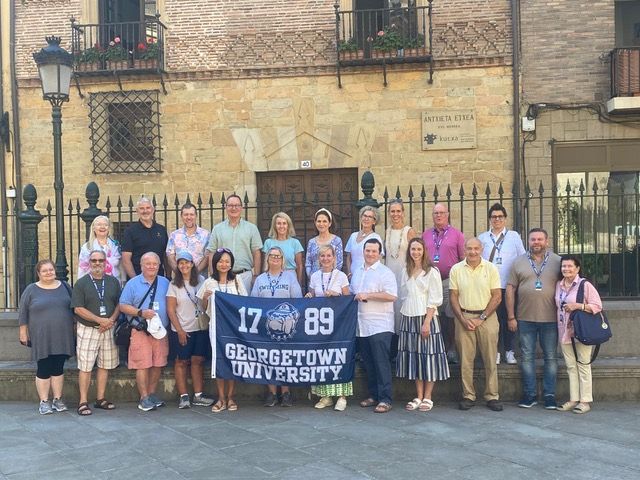
Owen also spoke about one of her completed projects, the Presidential and Congressional Academies for teachers and students. In the first year, this two-week intensive residential program brought teachers and high-need students from across the country to the Baltimore/Washington area to learn from scholars, and develop civic dispositions and skills. She appreciated the diversity of participants’ backgrounds and their openness to new experiences.
Owen’s latest endeavor, Project Community: Engaging All Students in Media Literacy and Public Policy, another collaboration with the Center that is funded by the Department of Education ($2.6m) is about to commence. She is excited about this project which unites her interests in responsible political communication and civic education and engagement.
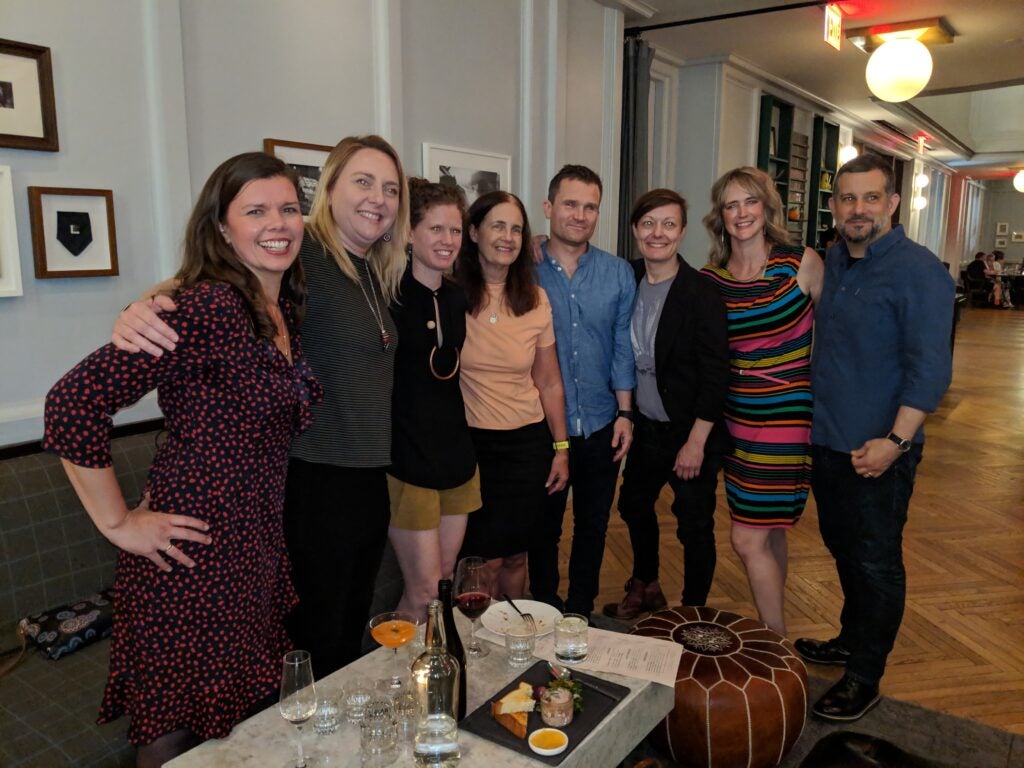
Owen’s partnership with the Center has generated over $40m in grant funding. She has also participated in various other projects, such as an art-based civic engagement program sponsored by the Diplomatic Reception Rooms at the U.S. Department of State and the Clinton Foundation Leadership Academy for high-need students situated in classes throughout the state. She’s worked with Bill of Rights Institute and studied the effectiveness of primary documents as a way of instructing civics. She has employed the Positive Youth Development (PYD) framework on a USAID-funded project focused on youth engagement in decision-making in Armenia. She was recently named the evaluator of the initial five pilot projects of Educating for American Democracy, an unprecedented initiative to provide guidance and an inquiry framework, the Roadmap to Educating for American Democracy, that states, local school districts, and educators can use to transform teaching of history and civics to meet the needs of a diverse 21st century K–12 student body. CCT students will be working with CERL on this project.
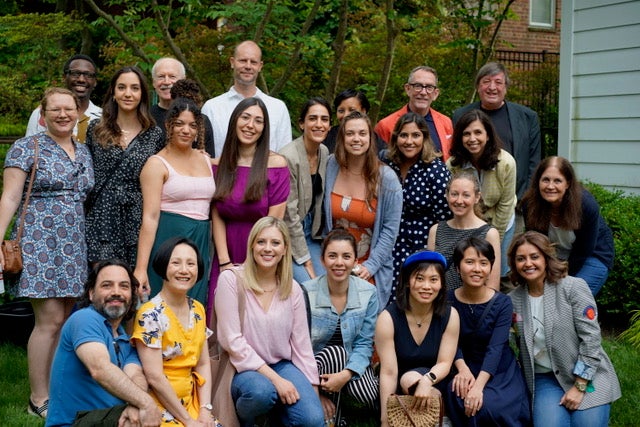
Owen will be teaching two classes next semester: Advanced Statistics and Media and Civic Engagement. Advanced Statistics builds upon core statistical techniques, including difference of means tests, regression analysis, data reduction and scaling techniques, graphical analysis, and more. Media and Civic Engagement is being taught in conjunction with the Dialogue Across Difference and Civic Engagement initiatives supported by the President’s Office which is participating in a coalition of twenty universities from across the country. Owen is designing a course that incorporates aspects of how to have civil discourse about difficult issues and how it takes place in society. The course also looks at how people on our campuses are engaging civically. In preparation, she’s compiling an inventory of civic engagement organizations and opportunities across campus, and CCT students in the course will play an active role in developing ways of measuring and tapping into civic engagement.
Owen greatly enjoys working with CCT students and incorporating active learning into her classes. She loves the insights CCT students bring to her research by thinking outside the box and bringing new perspectives.